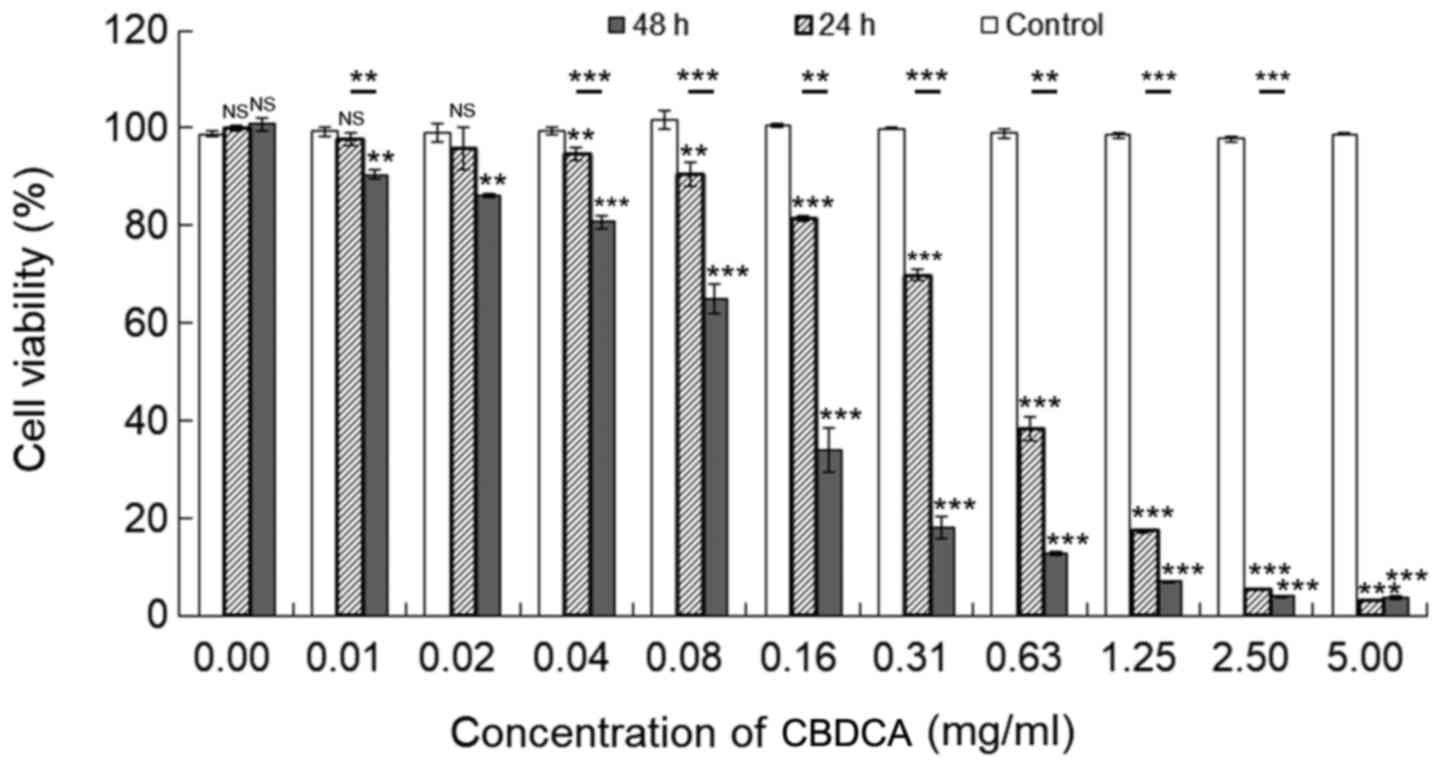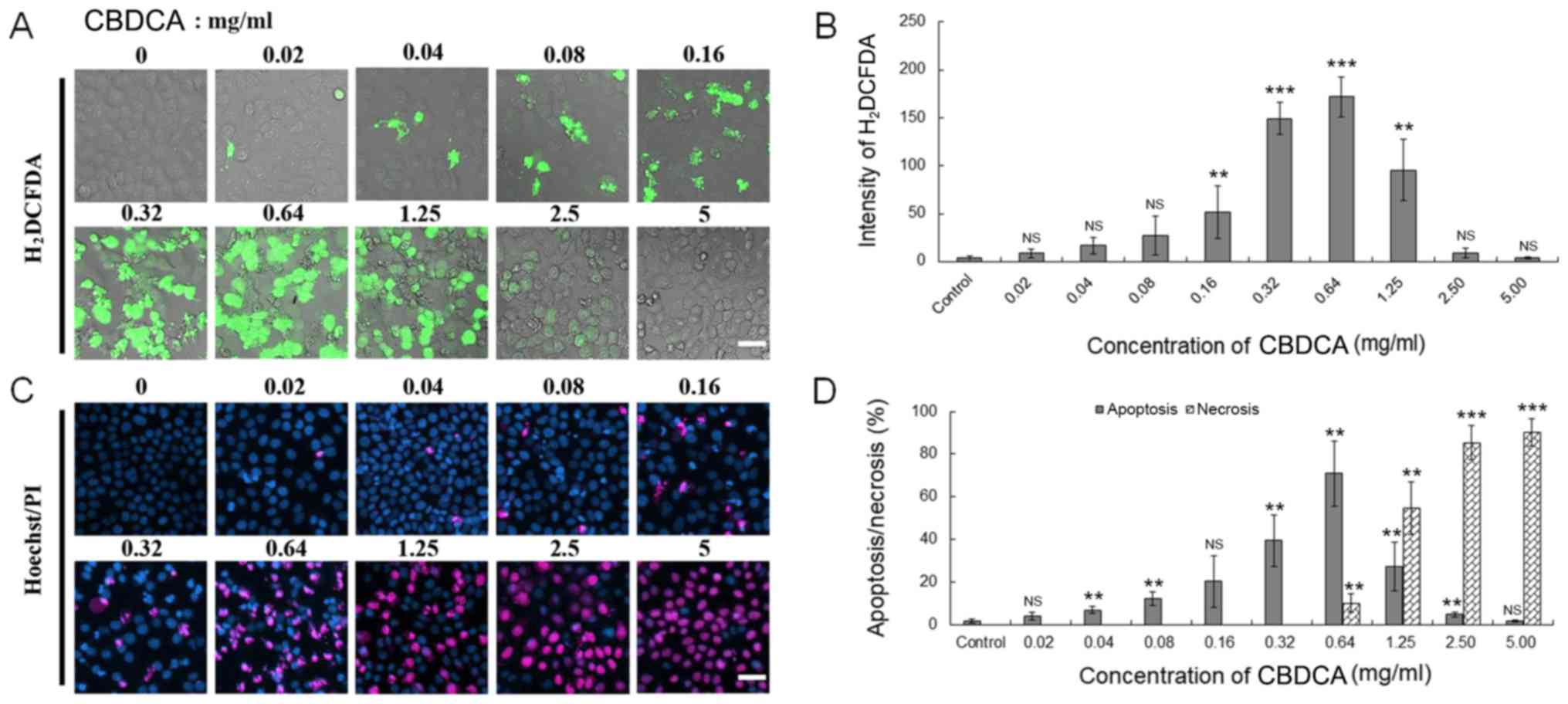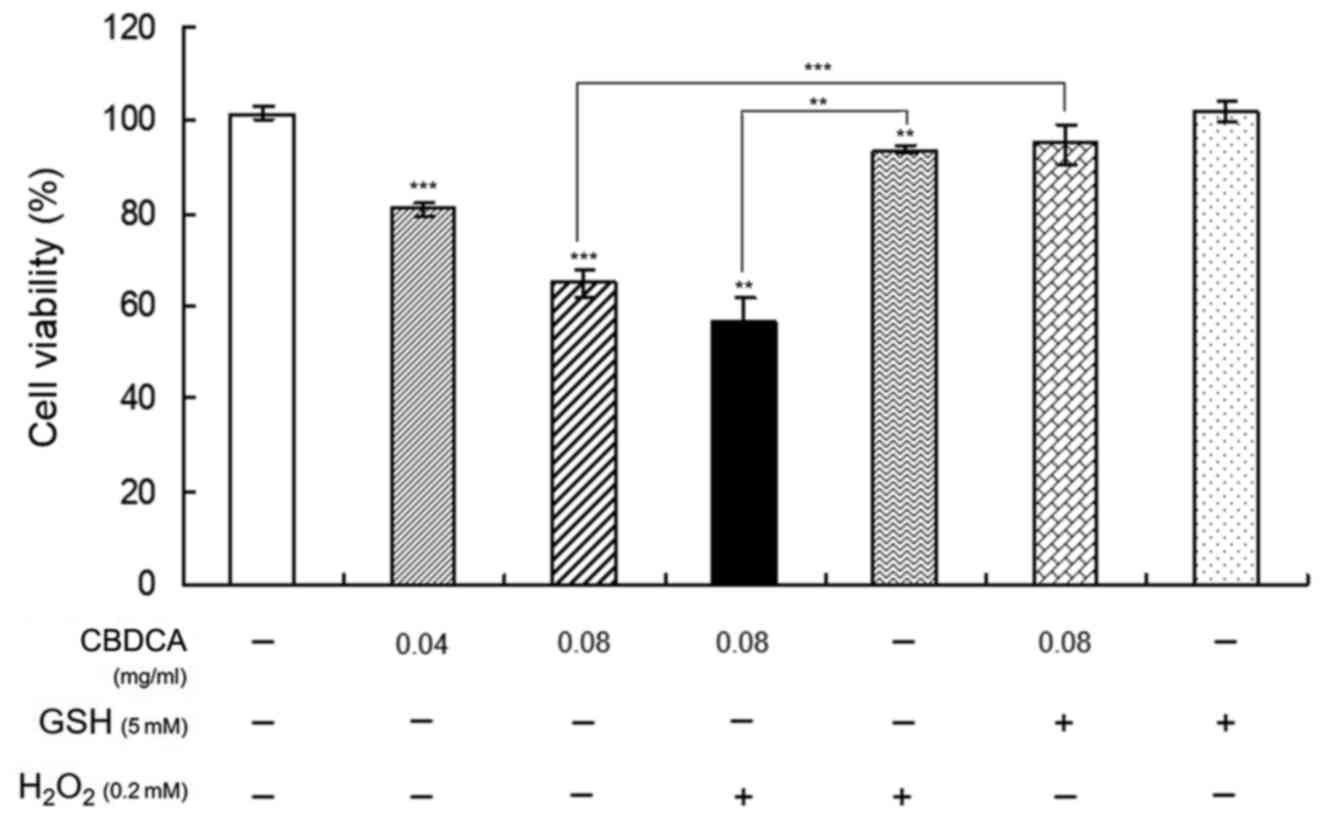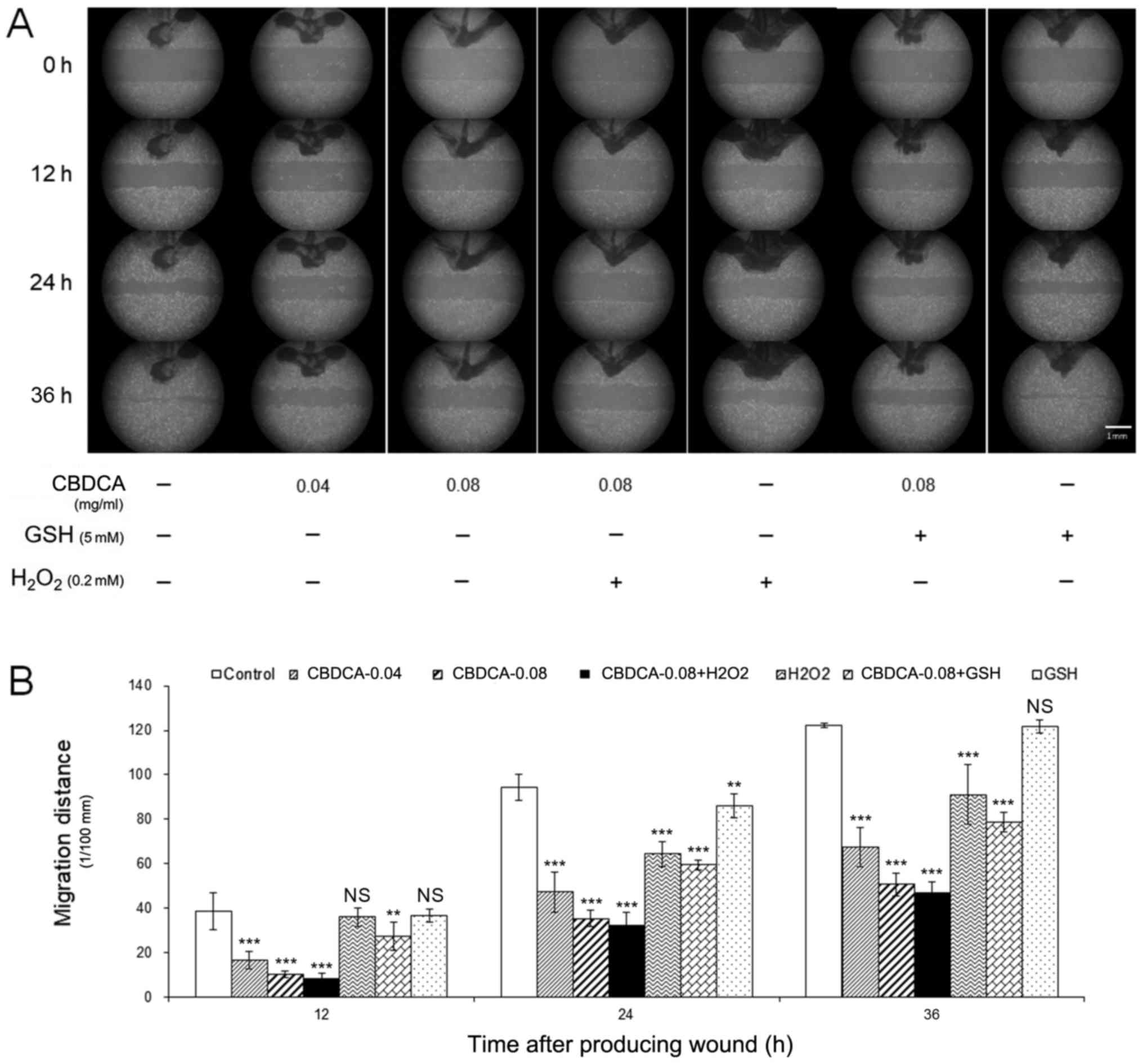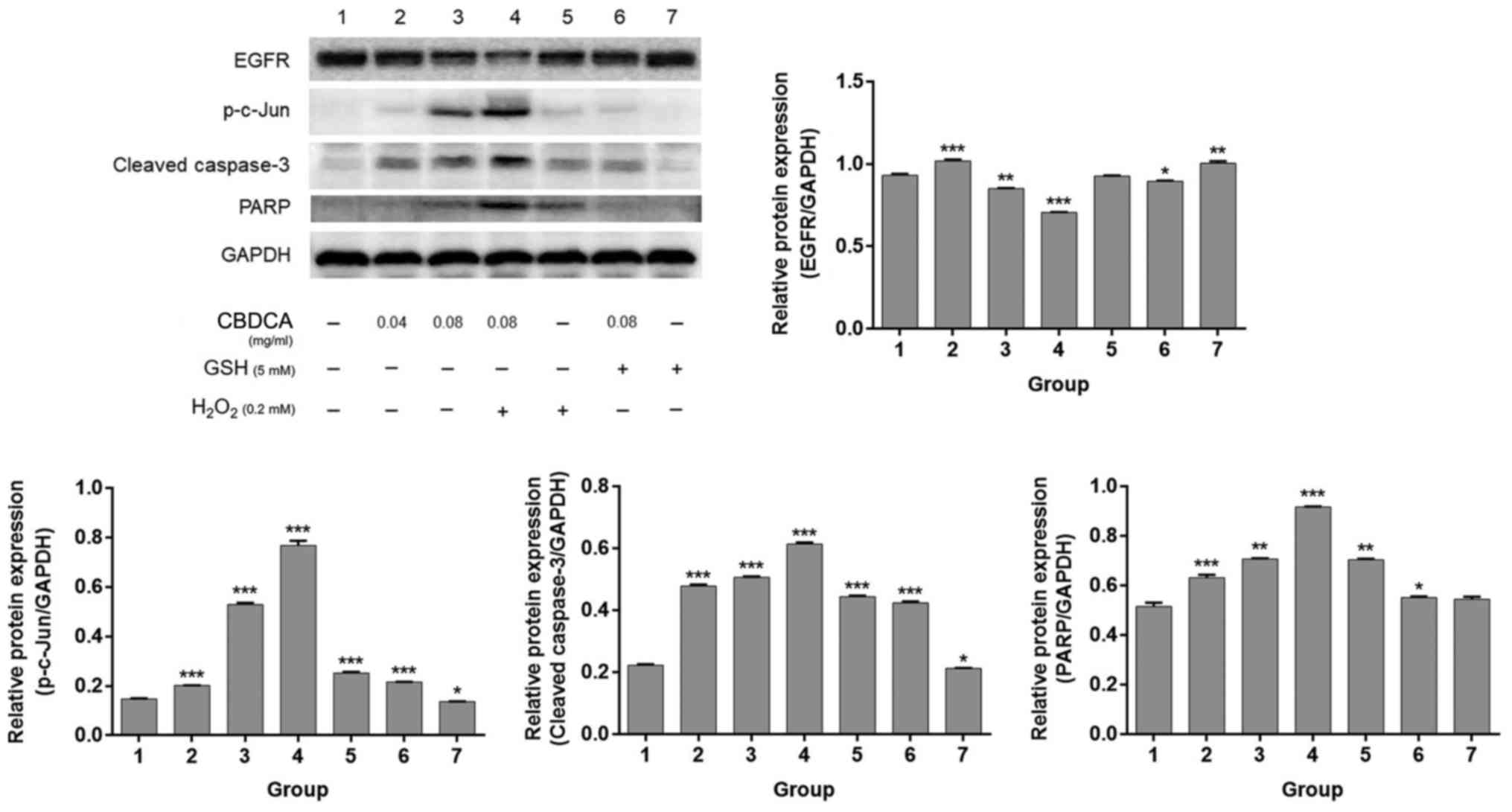|
1
|
Zhang W, Yan Y, Gu M, Wang X, Zhu H, Zhang
S and Wang W: High expression levels of Wnt5a and Ror2 in laryngeal
squamous cell carcinoma are associated with poor prognosis. Oncol
Lett. 14:2232–2238. 2017. View Article : Google Scholar : PubMed/NCBI
|
|
2
|
Siegel R, Naishadham D and Jemal A: Cancer
statistics, 2013. CA Cancer J Clin. 63:11–30. 2013. View Article : Google Scholar : PubMed/NCBI
|
|
3
|
Riga M, Chelis L, Danielides V, Vogiatzaki
T, Pantazis TL and Pantazis D: Systematic review on T3 laryngeal
squamous cell carcinoma; still far from a consensus on the optimal
organ preserving treatment. Eur J Surg Oncol. 43:20–31. 2017.
View Article : Google Scholar : PubMed/NCBI
|
|
4
|
Shen Z, Cao B, Lin L, Zhou C, Ye D, Qiu S,
Li Q and Cui X: The clinical signification of claudin-11 promoter
hypermethylation for laryngeal squamous cell carcinoma. Med Sci
Monit. 23:3635–3640. 2017. View Article : Google Scholar : PubMed/NCBI
|
|
5
|
Jemal A, Siegel R, Ward E, Hao Y, Xu J and
Thun MJ: Cancer statistics, 2009. CACancerJ Clin. 59:225–249. 2009.
View Article : Google Scholar
|
|
6
|
Dirix P, Lambrecht M and Nuyts S:
Radiotherapy for laryngeal squamous cell carcinoma: Current
standards. Expert Rev Anticancer Ther. 10:1461–1469. 2010.
View Article : Google Scholar : PubMed/NCBI
|
|
7
|
Xia CX, Zhu Q, Zhao HX, Yan F, Li SL and
Zhang SM: Usefulness of ultrasonography in assessment of laryngeal
carcinoma. Brit J Radiol. 86:201303432013. View Article : Google Scholar : PubMed/NCBI
|
|
8
|
Wang B, Lv K, Chen W, Jing Z, Jie L, Wu J,
Li Z, Hao Q, Wong TS, Yang W, et al: miR-375 and miR-205 regulate
the invasion and migration of laryngeal squamous cell carcinoma
synergistically via AKT-mediated EMT. Biomed Res Int.
2016:96527892016. View Article : Google Scholar : PubMed/NCBI
|
|
9
|
Phang CW, Karsani SA and Abd Malek SN:
Induction of apoptosis and cell cycle arrest by flavokawain C on
HT-29 human colon adenocarcinoma via enhancement of reactive oxygen
species generation, upregulation of p21, p27 and GADD153, and
inactivation of inhibitor of apoptosis proteins. Pharmacogn Mag. 13
Suppl 2:S321–S328. 2017. View Article : Google Scholar : PubMed/NCBI
|
|
10
|
Nakayama K, Murata S, Ito H, Iwasaki K,
Villareal MO, Zheng YW, Matsui H, Isoda H and Ohkohchi N:
Terpinen-4-ol inhibits colorectal cancer growth via reactive oxygen
species. Oncol Lett. 14:2015–2024. 2017. View Article : Google Scholar : PubMed/NCBI
|
|
11
|
Allison SE, Chen Y, Petrovic N, Zhang J,
Bourget K, Mackenzie PI and Murray M: Activation of ALDH1A1 in
MDA-MB-468 breast cancer cells that over-express CYP2J2 protects
against paclitaxel-dependent cell death mediated by reactive oxygen
species. Biochem Pharmacol. 143:79–89. 2017. View Article : Google Scholar : PubMed/NCBI
|
|
12
|
Choi YH: Diallyl trisulfide induces
apoptosis and mitotic arrest in AGS human gastric carcinoma cells
through reactive oxygen species-mediated activation of
AMP-activated protein kinase. Biomed Pharmacother. 94:63–71. 2017.
View Article : Google Scholar : PubMed/NCBI
|
|
13
|
Chang YT, Huang CY, Tang JY, Liaw CC, Li
RN, Liu JR, Sheu JH and Chang HW: Reactive oxygen species mediate
soft corals-derived sinuleptolide-induced antiproliferation and DNA
damage in oral cancer cells. Onco Targets Ther. 10:3289–3297. 2017.
View Article : Google Scholar : PubMed/NCBI
|
|
14
|
Kim KY, Park KI, Kim SH, Yu SN, Park SG,
Kim YW, Seo YK, Ma JY and Ahn SC: Inhibition of autophagy promotes
salinomycin-induced apoptosis via reactive oxygen species-mediated
PI3K/AKT/mTOR and ERK/p38 MAPK-dependent signaling in human
prostate cancer cells. Int J Mol Sci. 18:10882017. View Article : Google Scholar
|
|
15
|
Shagieva G, Domnina L, Makarevich O,
Chernyak B, Skulachev V and Dugina V: Depletion of mitochondrial
reactive oxygen species downregulates epithelial-to-mesenchymal
transition in cervical cancer cells. Oncotarget. 8:4901–4913. 2017.
View Article : Google Scholar : PubMed/NCBI
|
|
16
|
He P, Ahn JC, Shin JI and Chung PS:
Photoactivation of 9-hydroxypheophorbide alpha triggers apoptosis
through the reactive oxygen species-mediated mitochondrial pathway
and endoplasmic reticulum stress in AMC-HN-3 laryngeal cancer
cells. Int J Oncol. 36:801–808. 2010.PubMed/NCBI
|
|
17
|
He P, Ahn JC, Shin JI, Hwang HJ, Kang JW,
Lee SJ and Chung PS: Enhanced apoptotic effect of combined modality
of 9-hydroxypheophorbide alpha-mediated photodynamic therapy and
carboplatin on AMC-HN-3 human head and neck cancer cells. Oncol
Rep. 21:329–334. 2009.PubMed/NCBI
|
|
18
|
Baek MW, Cho HS, Kim SH, Kim WJ and Jung
JY: Ascorbic acid induces necrosis in human laryngeal squamous cell
carcinoma via ROS, PKC, and calcium signaling. J Cell Physiol.
232:417–425. 2017. View Article : Google Scholar : PubMed/NCBI
|
|
19
|
Castrellon AB, Pidhorecky I, Valero V and
Raez LE: The role of carboplatin in the neoadjuvant chemotherapy
treatment of triple negative breast cancer. Oncol Rev. 11:3242017.
View Article : Google Scholar : PubMed/NCBI
|
|
20
|
de Castria TB, da Silva EM, Gois AF and
Riera R: Cisplatin versus carboplatin in combination with
third-generation drugs for advanced non-small cell lung cancer.
Cochrane Database Syst Rev. 16:CD0092562013.
|
|
21
|
Collins IM, Roberts-Thomson R, Faulkner D,
Rischin D, Friedlander M and Mileshkin L: Carboplatin dosing in
ovarian cancer: Problems and pitfalls. Int J Gynecol Cancer.
21:1213–1218. 2011.PubMed/NCBI
|
|
22
|
Chikazawa K, Netsu S and Konno R: Outcomes
of concurrent radiotherapy and weekly paclitaxel/carboplatin
therapy in cervical cancer: A retrospective study. Eur J Gynaecol
Oncol. 37:511–516. 2016.PubMed/NCBI
|
|
23
|
Pisters KM, Vallières E, Crowley JJ,
Franklin WA, Bunn PA Jr, Ginsberg RJ, Putnam JB Jr, Chansky K and
Gandara D: Surgery with or without preoperative paclitaxel and
carboplatin in early-stage non-small-cell lung cancer: Southwest
Oncology Group Trial S9900, an intergroup, randomized, phase III
trial. J Clin Oncol. 28:1843–1849. 2010. View Article : Google Scholar : PubMed/NCBI
|
|
24
|
Ho GY, Woodward N and Coward JI: Cisplatin
versus carboplatin: Comparative review of therapeutic management in
solid malignancies. Crit Rev Oncol Hematol. 102:37–46. 2016.
View Article : Google Scholar : PubMed/NCBI
|
|
25
|
Cheng CF, Juan SH, Chen JJ, Chao YC, Chen
HH, Lian WS, Lu CY, Chang CI, Chiu TH and Lin H: Pravastatin
attenuates carboplatin-induced cardiotoxicity via inhibition of
oxidative stress associated apoptosis. Apoptosis. 13:883–894. 2008.
View Article : Google Scholar : PubMed/NCBI
|
|
26
|
Mao WJ, Zhang HK, Shen B and Pei-Jie HE:
Role of reactive oxygen series generation in the apoptosis of HN-3
human laryngeal carcinoma cells induced by carboplatin. Chin J
Ophthalmol Otorhinolaryngol. 15:384–387. 2015.
|
|
27
|
Kim SY, Chu KC, Lee HR, Lee KS and Carey
TE: Establishment and characterization of nine new head and neck
cancer cell lines. Acta Otolaryngol. 117:775–784. 1997. View Article : Google Scholar : PubMed/NCBI
|
|
28
|
Morin C and Fortin S: Docosahexaenoic acid
monoglyceride increases carboplatin activity in lung cancer models
by targeting EGFR. Anticancer Res. 37:6015–6023. 2017.PubMed/NCBI
|
|
29
|
Ryu H, Song IC, Choi YS, Yun HJ, Jo DY,
Kim JM, Ko YB and Lee HJ: ERCC1 expression status predicts the
response and survival of patients with metastatic or recurrent
cervical cancer treated via platinum-based chemotherapy. Medicine
(Baltimore). 96:e94022017. View Article : Google Scholar : PubMed/NCBI
|
|
30
|
Bayés M, Rabasseda X and Prous JR:
Gateways to clinical trials. Methods Find Exp Clin Pharmacol.
29:697–735. 2007.PubMed/NCBI
|
|
31
|
Yazawa H, Hiraiwa T, Ito F and Fujimori K:
Long-term recurrence-free survival of a patient with advanced pure
primary ovarian squamous cell carcinoma treated with dose-dense
paclitaxel combined with carboplatin. Obstet Gynecol Sci.
60:587–592. 2017. View Article : Google Scholar : PubMed/NCBI
|
|
32
|
Han S, Hong Y, Liu T, Wu N and Ye Z: The
efficacy and safety of paclitaxel and carboplatin with versus
without bevacizumab in patients with non-small-cell lung cancer: A
systematic review and meta-analysis. Oncotarget. 9:14619–14629.
2017.PubMed/NCBI
|
|
33
|
Liu JJ, Kim Y, Yan F, Ding Q, Ip V, Jong
NN, Mercer JF and Mckeage MJ: Contributions of rat Ctr1 to the
uptake and toxicity of copper and platinum anticancer drugs in
dorsal root ganglion neurons. Biochem Pharmacol. 85:207–215. 2013.
View Article : Google Scholar : PubMed/NCBI
|
|
34
|
Knox RJ, Friedlos F, Lydall DA and Roberts
JJ: Mechanism of cytotoxicity of anticancer platinum drugs:
Evidence that cis-diamminedichloroplatinum(II) and
cis-diammine-(1,1-cyclobutanedicarboxylato)platinum(II) differ only
in the kinetics of their interaction with DNA. Cancer Res.
46:1972–1979. 1986.PubMed/NCBI
|
|
35
|
McWhinney SR, Goldberg RM and McLeod HL:
Platinum neurotoxicity pharmacogenetics. Mol Cancer Ther. 8:10–16.
2009. View Article : Google Scholar : PubMed/NCBI
|
|
36
|
Ardizzoni A, Boni L, Tiseo M, Fossella FV,
Schiller JH, Paesmans M, Radosavljevic D, Paccagnella A, Zatloukal
P, Mazzanti P, et al: Cisplatin-versus carboplatin-based
chemotherapy in first-line treatment of advanced non-small-cell
lung cancer: An individual patient data meta-analysis. J Natl
Cancer Inst. 99:847–857. 2007. View Article : Google Scholar : PubMed/NCBI
|
|
37
|
He P, Shen B, Chung PS, Ahn JC and Zhou L:
Photosensitizer effect of 9-hydroxypheophorbide α on diode
laser-irradiated laryngeal cancer cells: Oxidative stress-directed
cell death and migration suppression. Oncol Lett. 12:1889–1895.
2016. View Article : Google Scholar : PubMed/NCBI
|
|
38
|
Nishimura G, Tsukuda M, Mikami Y, Matsuda
H, Horiuchi C, Taguchi T, Takahashi M, Kawakami M, Watanabe M, Niho
T, et al: Efficacy of concurrent chemoradiotherapy for T1 and T2
laryngeal squamous cell carcinoma regarding organ preservation.
Anticancer Res. 29:661–666. 2009.PubMed/NCBI
|
|
39
|
Park WH and You BR: Antimycin A induces
death of the human pulmonary fibroblast cells via ROS increase and
GSH depletion. Int J Oncol. 48:813–820. 2016. View Article : Google Scholar : PubMed/NCBI
|
|
40
|
Singsai K, Akaravichien T, Kukongviriyapan
V and Sattayasai J: Protective effects of streblus asper leaf
extract on H2O2-induced ROS in SK-N-SH Cells and MPTP-induced
parkinson's disease-like symptoms in C57BL/6 mouse. Evid Based
Complement Alternat Med. 2015:9703542015. View Article : Google Scholar : PubMed/NCBI
|















